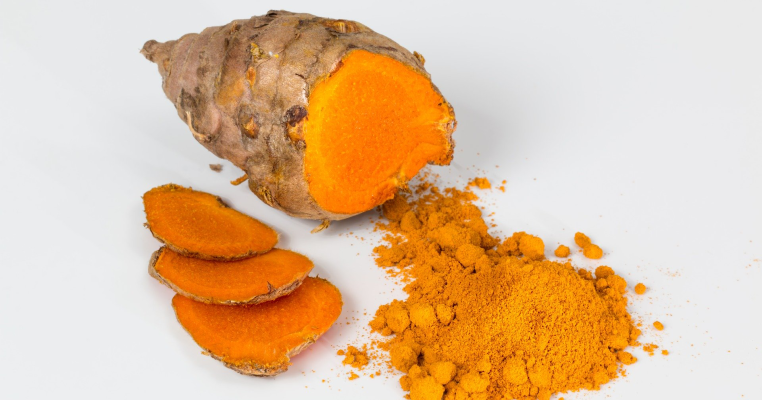 Turmeric comes from the root of the Curcuma longa Herb, which is native to Indonesia and southern India, and is widely used as an ingredient in curry dishes and yellow mustard. As research into this powerful herb has increased, it has emerged as one of nature’s most powerful potential healers.
Turmeric comes from the root of the Curcuma longa Herb, which is native to Indonesia and southern India, and is widely used as an ingredient in curry dishes and yellow mustard. As research into this powerful herb has increased, it has emerged as one of nature’s most powerful potential healers.
Turmeric’s Beneficial Effects in a Nutshell
Strengthens and improves digestion• Reduces gas and bloating
• Assists in the digestion of protein
• Improves your body's ability to digest fats
• Promotes proper metabolism, correcting both excesses and deficiencies
• Maintains and improves intestinal flora
• Improves elimination of wastes and toxins
Supports healthy liver function and detox
• Turmeric helps increase bile flow making it a liver cleanser that can rejuvenate your liver cells and recharge their capability to break down toxins
• Helps to prevent alcohol and other toxins from being converted into compounds that may be harmful to your liver
• Supports formation of healthy tissue
Purifies your blood
• Stimulates formation of new blood tissue
• Anti-inflammatory: Helps to reduce irritation to tissues characterized by pain, redness, swelling and heat
Contains curcuminoids that fight cancer, arthritis, and Alzheimer’s
• Curcuminoids are potent phytonutrients (plant-based nutrients) that contain powerful antioxidant properties
• Counteract the damaging effects of free radicals in your body
• Relieve arthritis pain and stiffness, anti-inflammatory agent
• Anti-carcinogenic: Curcumin has been shown to prevent a large number of cancers in animal studies. Laboratory data indicate that curcumin can inhibit tumor initiation, promotion, invasion, angiogenesis and metastasis.
• Supports treatment of Alzheimer’s disease: Because Alzheimer's disease is caused in part by amyloid-induced inflammation, curcumin has been shown to be effective against Alzheimer's. Clinical trials are in progress at UCLA with curcumin for Alzheimer's.
Curcumin: Turmeric’s Active Anti-Inflammatory “Ingredient”
Most notably turmeric is known for its potent anti-inflammatory properties, which come from curcumin -- the pigment that gives turmeric its yellow-orange color, and which is thought to be responsible for many of its medicinal effects. There are an estimated three to five grams of curcumin in 100 grams of turmeric.Curcumin has been shown to influence more than 700 genes, and it can inhibit both the activity and the synthesis of cyclooxygenase-2 (COX2) and 5-lipooxygenase (5-LOX), as well as other enzymes that have been implicated in inflammation.
Turmeric’s Cancer-Fighting Properties
In India where turmeric is widely used, the prevalence of four common Irish cancers -- colon, breast, prostate and lung -- is 10 times lower. In fact, prostate cancer, which is the most frequently diagnosed cancer in U.S. men, is rare in India and this is attributed, in part, to turmeric.Numerous studies have looked into this potential cancer-fighting link, with promising results. For instance, curcumin has been found to:
• Inhibit the proliferation of tumor cells
• Inhibit the transformation of cells from normal to tumor
• Help your body destroy mutated cancer cells so they cannot spread throughout your body
• Decrease inflammation
• Enhance liver function
• Inhibit the synthesis of a protein thought to be instrumental in tumor formation
• Prevent the development of additional blood supply necessary for cancer cell growth
As for the results of research studies, a study in Biochemical Pharmacology found that curcumin can slow the spread of breast cancer cells to the lungs in mice.
Turmeric’s Essential Role for Your Liver
Your liver’s primary role is to process and remove toxins carried in your bloodstream. When functioning at its peak, it can filter up to two liters of blood per minute and easily break apart toxic molecules to reduce their toxicity. Your liver is also a crucial part of vitamin, mineral, protein, fat, carbohydrate and hormonal metabolism.However, poor diet, allergens, pollution and stress can cause your liver to become sluggish, and this can impair its vital functions. This is where turmeric can be a very useful part of your liver support system. Studies have shown that it:
• May increase important detoxification enzymes in your liver
• Induces the formation of a primary liver detoxification enzyme, glutathione S-transferase (GST) enzymes
Turmeric is also a natural cholagogue, a medicinal agent that promotes the discharge of bile from your system. Increased bile flow is important to help your liver detoxify and to help your body digest fats




 Follow me on facebook
Follow me on facebook